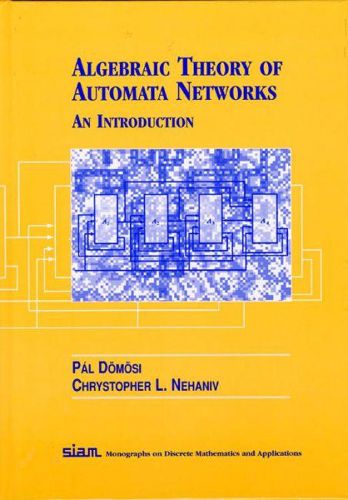Readings Newsletter
Become a Readings Member to make your shopping experience even easier.
Sign in or sign up for free!
You’re not far away from qualifying for FREE standard shipping within Australia
You’ve qualified for FREE standard shipping within Australia
The cart is loading…






Algebraic Theory of Automata Networks investigates automata networks as algebraic structures and develops their theory in line with other algebraic theories, such as those of semigroups, groups, rings, and fields. The authors also investigate automata networks as products of automata, that is, as compositions of automata obtained by cascading without feedback or with feedback of various restricted types or, most generally, with the feedback dependencies controlled by an arbitrary directed graph. This self-contained book surveys and extends the fundamental results in regard to automata networks, including the main decomposition theorems of Letichevsky, of Krohn and Rhodes, and of others. Algebraic Theory of Automata Networks summarizes the most important results of the past four decades regarding automata networks and presents many new results discovered since the last book on this subject was published. It contains several new methods and special techniques not discussed in other books, including characterization of homomorphically complete classes of automata under the cascade product; products of automata with semi-Letichevsky criterion and without any Letichevsky criteria; automata with control words; primitive products and temporal products; network completeness for digraphs having all loop edges; complete finite automata network graphs with minimal number of edges; and emulation of automata networks by corresponding asynchronous ones.
$9.00 standard shipping within Australia
FREE standard shipping within Australia for orders over $100.00
Express & International shipping calculated at checkout
Algebraic Theory of Automata Networks investigates automata networks as algebraic structures and develops their theory in line with other algebraic theories, such as those of semigroups, groups, rings, and fields. The authors also investigate automata networks as products of automata, that is, as compositions of automata obtained by cascading without feedback or with feedback of various restricted types or, most generally, with the feedback dependencies controlled by an arbitrary directed graph. This self-contained book surveys and extends the fundamental results in regard to automata networks, including the main decomposition theorems of Letichevsky, of Krohn and Rhodes, and of others. Algebraic Theory of Automata Networks summarizes the most important results of the past four decades regarding automata networks and presents many new results discovered since the last book on this subject was published. It contains several new methods and special techniques not discussed in other books, including characterization of homomorphically complete classes of automata under the cascade product; products of automata with semi-Letichevsky criterion and without any Letichevsky criteria; automata with control words; primitive products and temporal products; network completeness for digraphs having all loop edges; complete finite automata network graphs with minimal number of edges; and emulation of automata networks by corresponding asynchronous ones.